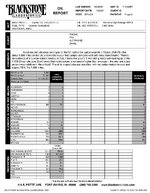If it won't know the difference between 0w20 and 5w20 then your argument can be reversed, find the cheapest house brand 0w20 and it won't be able to tell the difference. I get your point, but I have a lot of 0w20 to go through and that is what I am going to do.
No; my logic cannot be reversed.
There is no 0w-XX that I know of that isn't a synthetic of some nature.
There are some 5w-XX lubes that are conventional, or semi-syn. (these are going to cost less if all other things are considered equal)
The fact that you have a lot of 0w oil laying about is OK; certainly makes sense to use that up first. But that is not germane to my point; it's a sidebar anecdote.
There is a need for synthetic since that is what the 2GR was designed around.
There is no "need" for a synthetic; 2GR wasn't designed around a "synthetic"; that's a myth. The engine was designed with a proper modern lubrication spec in mind; not a base stock. The 2GR engine series was released in 2005; it was being designed starting in 2003. At the time the engine was designed on paper I suppose that API SM was prominent, By 2010, SN/GF-5 were released. There were no significant design changes to that engine which necessitated a lube spec change. The lube industry evolved, but the engine was "designed" when SM/GF-4 was in play. Those specs were easily met by an entire industry of conventional oils at the time. Even in 2017, when your FIL's engine was made, synthetic lubes were not a necessity; only oils meeting the API SN spec (which many conventional oils of the time could do). Additionally, these same engines are still spec'd for 5w-30 in most other regions other than North America. Any lube meeting a 5w grade with a SN rating would suffice quite well. Obviously, today SP is the dominant rating, and to meet that rating, some form of base stock improvement is required to meet that spec. But what the 2017 engine was originally designed with in mind, and what your brain thinks it "needs" are two entirely different things.
NOTE: the 2GR is just a smaller displacement version of the 1GR series; an engine that was released in 2002, and probably on paper in 1999???? This GR engine design harkens back more than two decades in its basic form. Changes have come in terms of valve actuation (single to dual VVTi) and fuel injection (port, DI, and dual), etc. But the basic design of the GR engine is actually much older than folks think.
NOTE: per the 2017 Camry owner's manual, page 501, the oil spec is "ILSAC GF-5 multigrade engine oil". They "recommend" 0w-20, but that is not a requirement; only a GF-5 lube is what is "needed".
That is what it is going to get.
What you intend to feed it is your choice; that's your prerogative. Nothing wrong with your current choice; it will do well, as it has shown. But so would just about any other lube as long as it's the proper spec, regardless of viscosity grade.
But please do realize that other people (many of them newbies) come lurking around BITOG. What you are claiming as fact is really just your opinion based on your biases and misinformation. The FACTS are that the 2GR engine was designed around a lube spec (SM) incredibly common around the world, and only North America applications recommend the 0w synthetic grades as times have evolved. Elsewhere in the world, it would be perfectly acceptable to run a 5w-20 or 5w-30 conventional oil which met SM/GF-4 or better in that engine.
***********
All that being said, this UOA shows the engine is in decent health (as expected).
And the lube did its job. (As would most any other SM or better, regardless of base stock).

